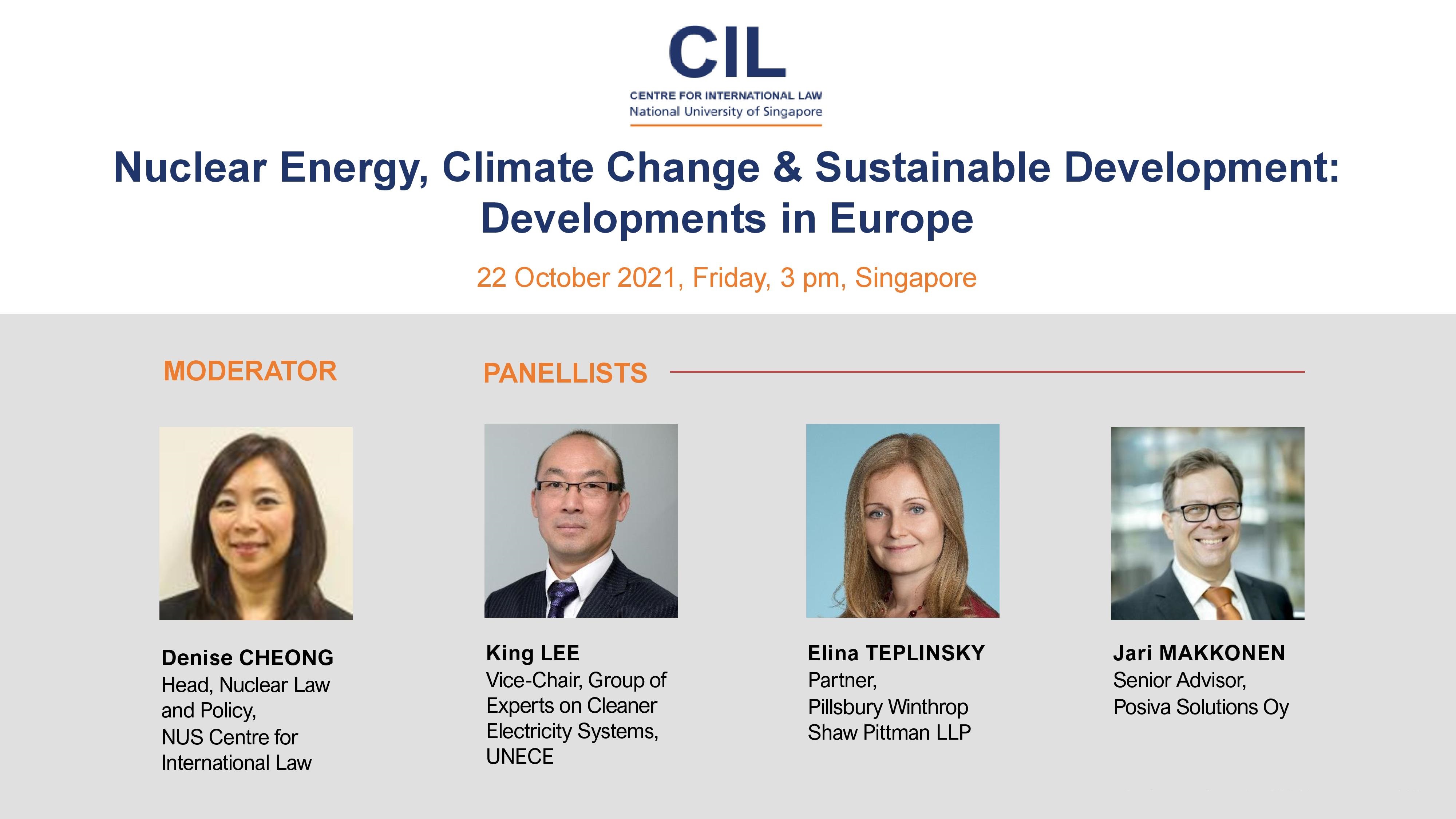Venue
Start
End
Time
Downloads
Elina Teplisky_ EU Taxonomy_CIL Webinar (22.10.2021)
Jari Makkonen_Sustainable Final Disposal of Spent Nuclear Fuel in Finland (22.10.2021)
Selected Documents on Nuclear Energy Climate Change and Sustainable Development (22.10.2021)

The presentation slides are available for download at the left side of this webpage.
Ahead of the 2021 United Nations Climate Change Conference (COP26), this webinar will explore the role of nuclear energy in climate action and sustainable development by focusing on recent developments in Europe. The webinar will provide an overview of the ongoing policy dialogue taking place within the United National Economic Commission for Europe (UNECE) region on the role of nuclear energy in climate action and sustainable development and how it is being shaped by the global discourse on this topic and member states’ national policies towards nuclear energy. The webinar will also address ongoing developments related to the EU taxonomy of sustainable economic activities (within the context of the EU Taxonomy Climate Delegated Act) and implications of the inclusion (or exclusion) of nuclear energy in the taxonomy on nuclear projects both in the EU and worldwide. Given that the final disposal of high-level radioactive waste is a key challenge for the sustainability of nuclear energy, the webinar will take a closer look at the progress Finland has made in relation to its construction of the world’s first deep geological repository. Through this webinar, the Centre for International Law aims to contribute to the emerging regional discourse on the role of nuclear energy in climate action and sustainable development.
MODERATOR
 Denise Cheong is the Head of Nuclear Law and Policy at the Centre for International Law, National University of Singapore. Her research interests span law and policy issues that cut across the nuclear, ocean and environmental sectors and presently includes those relating to the governance of floating nuclear power plants and the use of environmental law mechanisms to promote transboundary consultation within the context of nuclear power development. At the regional level, her research work involves a documentary analysis of ASEAN instruments relevant to the governance of nuclear power in Southeast Asia and the mapping of the associated legal and institutional frameworks. She is a member of the International Nuclear Law Association and the Asia-Pacific Centre for Environmental Law.
Denise Cheong is the Head of Nuclear Law and Policy at the Centre for International Law, National University of Singapore. Her research interests span law and policy issues that cut across the nuclear, ocean and environmental sectors and presently includes those relating to the governance of floating nuclear power plants and the use of environmental law mechanisms to promote transboundary consultation within the context of nuclear power development. At the regional level, her research work involves a documentary analysis of ASEAN instruments relevant to the governance of nuclear power in Southeast Asia and the mapping of the associated legal and institutional frameworks. She is a member of the International Nuclear Law Association and the Asia-Pacific Centre for Environmental Law.
PANELLISTS
 King Lee is the Director of the Harmony Programme at World Nuclear Association, the nuclear industry’s vision for the future of electricity. In this role, he has led strategic cooperation with key international institutions, such as UNECE, ASEAN and Clean Energy Ministerial and World Energy Council, on the development of nuclear power. King is the Vice Chair of UNECE Group of Experts on Cleaner Electricity Systems and Chair of UNECE Nuclear Fuel Working Group and a member of the Nuclear Energy Agency Nuclear Innovation 2050 Advisory Panel and Clean Energy Ministerial Flexible Nuclear Campaign Working Group. Previously, King was Head of Nuclear Development at Lloyd’s Register.
King Lee is the Director of the Harmony Programme at World Nuclear Association, the nuclear industry’s vision for the future of electricity. In this role, he has led strategic cooperation with key international institutions, such as UNECE, ASEAN and Clean Energy Ministerial and World Energy Council, on the development of nuclear power. King is the Vice Chair of UNECE Group of Experts on Cleaner Electricity Systems and Chair of UNECE Nuclear Fuel Working Group and a member of the Nuclear Energy Agency Nuclear Innovation 2050 Advisory Panel and Clean Energy Ministerial Flexible Nuclear Campaign Working Group. Previously, King was Head of Nuclear Development at Lloyd’s Register.

Elina Teplinsky is a Partner at Pillsbury Winthrop Shaw Pittman LLP and a leading member of the International Nuclear Projects and Hydrogen teams and Energy Industry Group deputy leader, focusing on international nuclear energy matters, including advice to U.S. and global clients on transactional and regulatory issues. She has worked on transactions for more than 30 countries and has been highly rated by Chambers Global. Elina is a co-chair of the World Nuclear Association’s Law Working Group and is a frequent lecturer at the World Nuclear University. She has been recognised as an expert nuclear adviser by the International Atomic Energy Agency, International Framework for Nuclear Energy Cooperation and Nuclear Energy Institute.
 Jari Makkonen is the Senior Advisor/Head of Sales and Marketing at Posiva Solutions Oy, the entity responsible for constructing the world´s first operational deep geological repository for the final disposal of spent nuclear fuel in Finland. Jari has international client advisory experience of 25 years with large enterprises and public organisations in the information and communications technology (ICT) industry. He joined Posiva Solutions in 2020. Posiva Solutions supports, on a commercial basis, nuclear waste management organisations in their own disposal programs by sharing the know-how and technologies Posiva has accumulated from its globally-leading design, research and development activities in final disposal.
Jari Makkonen is the Senior Advisor/Head of Sales and Marketing at Posiva Solutions Oy, the entity responsible for constructing the world´s first operational deep geological repository for the final disposal of spent nuclear fuel in Finland. Jari has international client advisory experience of 25 years with large enterprises and public organisations in the information and communications technology (ICT) industry. He joined Posiva Solutions in 2020. Posiva Solutions supports, on a commercial basis, nuclear waste management organisations in their own disposal programs by sharing the know-how and technologies Posiva has accumulated from its globally-leading design, research and development activities in final disposal.

